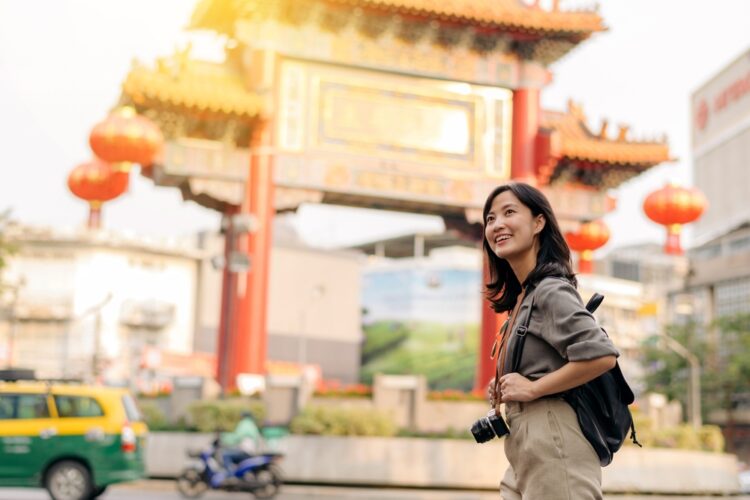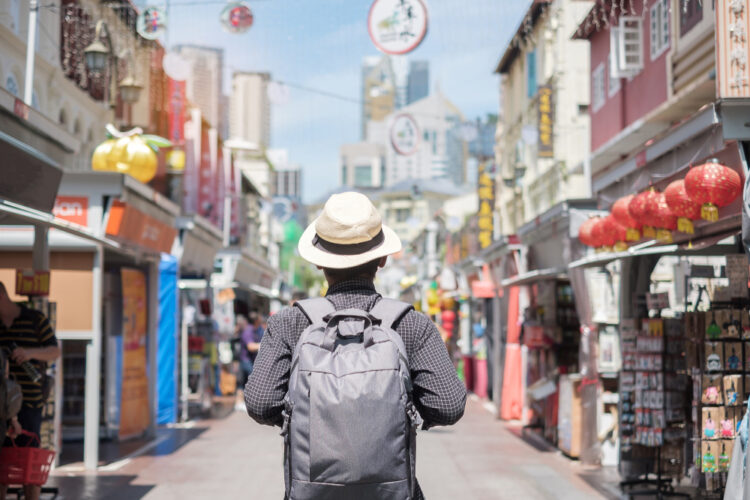Maybe you want to get away from your normal life for a while – to rediscover who you are, or just get some much-needed alone time. Maybe your relationship has ended, wreaking havoc on your plans for that dream trip to Africa. Maybe your best friend backed out of accompanying you to Asia, or perhaps for any number of reasons, you’ve found yourself suddenly solo.
You can see the world anyway. Not only can you see it alone – you probably should, at least once in your life. Encounter moments and places and people with your undivided attention: snapshots of a skyline, a midnight drink in a basement bar, a haggle in a market – no feedback, no diversions, just the experience.
The truth is, most people find themselves without a travel partner at some point, whether by accident or choice. Going it alone can be daunting, but guides and help are always there when you need them, and the freedom of making your own decisions without having to consider a companion can outweigh any disadvantages. Some “solo” travelers actually sign up with group tours where they don’t know any of the other travelers, creating the best of both worlds: they are “alone,” but others handle all of the details.

This being the case, solo travel is a fast-growing trend. Both single and partnered people of all ages are more independent than ever, and they are reluctant to let the lack of a significant other or scheduling conflicts keep them from seeing the world.
Planning is the key to an unforgettable trip. Wherever you’re headed, do as much advance preparation as possible. Research your destination, and be aware of its culture and traditions; for instance, in many Middle Eastern countries, it’s mandatory to wear appropriate clothing, and women are strongly discouraged from traveling alone. Knowing how you’ll get from place to place will help make your journey safe and enjoyable.
For an independent trip, a travel advisor can be your best friend. They are very familiar with single travelers, as an estimated 1 in 4 travelers goes alone, according to the Travel Industry Association of America. Travel advisors offer helpful suggestions, get the best deals and values, and connect you with reputable guides.

Many tour companies your travel advisor works with now cater to singles and specific age groups, often employing staff of similar ages. Tours offer more flexibility than you may realize, too – you can join a tour that assists you with every aspect of your vacation, or one designed for completely independent travelers; again, you are joining a large and important part of the travel market, and your agent will know how to make sure you have the kind of experience you’re counting on.
Not sure what to do on your trip? Investigate ecotours, spa vacations, and adventure travel like hiking, kayaking, or rafting. Learn to scuba dive or cook, bathe in a hot spring in Iceland, or go on a safari in Tanzania. Even if you just want to relax on a beach – its 100% your decision, so work with your travel consultant to create a trip you can get excited about.
Cruising is also a great way for singles to travel. The range of activities is so extensive that there’s no avoiding making friends while you participate. You can’t get lost, and you can relax knowing the details are under control. A variety of companies offer singles cruises – just ask your travel advisor.

At first, travel can seem expensive for the singles, because many rates are based on double occupancy. The good news is that most companies can place single people of the same gender, or other criteria you find acceptable, in accommodations together, so you save on single supplements. It is not uncommon to find a number of spots on a cruise or tour are available to singles without a single-supplement fee. Again, speak with your travel advisor to uncover your options.
Consider buying a travel guide geared toward single travelers. Restaurants and activities listed in these guides are typically frequented by other independent travelers, and you’ll have plenty of opportunities to meet people, if you’d like. While you are traveling, read the local paper to find lesser-known activities and events, which are usually one-of-a-kind, authentic opportunities to learn more about a culture.
Your first night in a new place can be intimidating, but you have several ways to make it less so. While safety may seem questionable, wandering the streets during the day is a good way to orient yourself, as long as you stay in the right neighborhoods. Before you head out, check with hotel staff to be sure you’re aware of areas to avoid, and remember the hotel address in the event that you get lost – tucking a copy of the hotel’s business card in your pocket is always a smart strategy. And if you do get lost, remember that everything is an adventure… and it will make a great story.
Talking to strangers could be easier than you think – and you may not have a choice in the matter. People generally don’t hesitate to speak to someone who’s alone, and some of your most memorable travel experiences may come from spontaneous invitations to join a group for a meal or special outing. A smile and a little eye contact go a long way, even if you don’t speak the local language. And while eating alone is something many people don’t enjoy, there’s no reason to hide away in a hotel room with take-out food. Being comfortable on your own is a skill you can develop, and you can get started by choosing a lively cafe or bistro with lots of people. If you feel conspicuous, consider sitting at the counter, where you can enjoy a drink or watch your food being prepared. Take something to read, or simply indulge in people-watching.
Safety is important for any traveler, but more so if you are alone. Be aware of everything going on around you – watch the television, read the news, talk to your concierge or guide. When you walk, keep your head up and walk confidently. Pay attention to what the locals wear and dress like they do, so you fit in.
Talk to your travel advisor about what to wear, cultural etiquette, and State Department or other government-issued warnings for your destination – understanding all these aspects of travel equally is important to maintain your safety. That said, traveling safely is easy with a little common sense: never leave your luggage unattended, don’t leave valuables in your room, don’t drink excessively or accept questionable drinks or food, and keep your money in a money belt worn under your clothes. Always have a backup plan and make sure someone is familiar with your itinerary – even if it’s a quick call or email back home. Once you’ve thought through all the safety scenarios, you can relax and enjoy your trip.

On the bright side, even many destinations like Egypt no longer bat an eye at a woman who dines alone, and despite standard safety concerns, the 21st century offers any independent traveler new freedoms and opportunities they’ve never had before.
Traveling alone inherently means you’ll have many moments to think, meditate, or just let your mind wander. Keeping a journal of your experiences make take some discipline, but writing daily will fill the time en route to a new stop on your journey and will also be an invaluable record of your trip. If you’re so inclined, consider your journal just as important, or more so, than a camera in documenting your time – once you re-read where you’ve been and what you’ve done, you’ll have no trouble recalling your experiences.
Speak to anyone who’s traveled alone, and they’ll tell you that one of the best perks is that you can pick up and go whenever and wherever you want – complete freedom, no distractions, and endless possibilities. So if you’ve always dreamed of going somewhere, it may be best not to wait for someone to come with you. Just plan the trip and go – traveling alone is one of the most unique and fulfilling experiences any soul could ever have.


